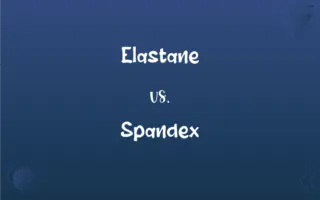Prescriptivism vs. Descriptivism: What's the Difference?
Edited by Aimie Carlson || By Harlon Moss || Published on January 29, 2024
Prescriptivism advocates for specific rules and standards in language use; descriptivism observes and records how language is actually used, without enforcing rules.

Key Differences
Prescriptivism in linguistics involves setting rules and standards for language use, often based on traditional norms. Descriptivism, conversely, is the approach of describing language as it is used by its speakers, acknowledging variations and changes over time.
Prescriptivism often dictates what is considered 'correct' or 'proper' in language, sometimes resisting language change. Descriptivism views language as a dynamic, evolving entity and focuses on recording actual usage, including colloquialisms and evolving grammar.
In prescriptivism, language is seen as having a correct form that should be adhered to, often taught in educational contexts. Descriptivism allows for a broader understanding of language, recognizing diverse dialects and sociolects as valid forms of communication.
Prescriptivism may criticize language use that deviates from established norms, viewing such deviations as incorrect. Descriptivism takes a more neutral stance, viewing all forms of language use as interesting and worthy of study, without judgment.
The debate between prescriptivism and descriptivism is fundamental in linguistics, reflecting differing views on the nature and function of language. Prescriptivism is about prescribing, while descriptivism is about describing.
ADVERTISEMENT
Comparison Chart
Approach to Language
Enforces specific rules and standards.
Observes and records how language is naturally used.
View on Language Change
Often resists changes, favoring traditional norms.
Accepts and documents language evolution and variation.
Focus
On 'correct' or 'proper' language use.
On actual language use in different contexts and communities.
Attitude Towards Variations
May view dialects and colloquialisms as incorrect.
Sees dialects and colloquialisms as valid and interesting.
Educational Role
Prominent in traditional language teaching.
Influential in modern linguistics and language study.
ADVERTISEMENT
Prescriptivism and Descriptivism Definitions
Prescriptivism
The belief in enforcing traditional language rules.
Prescriptivism dictates that we shouldn't end a sentence with a preposition.
Descriptivism
Observes language changes without judgment.
Descriptivism studies the emergence of new slang terms.
Prescriptivism
Focuses on teaching traditional grammar rules.
Prescriptivism in education emphasizes correct verb conjugation.
Descriptivism
Records actual language usage in different contexts.
Descriptivism explores the grammatical structures of regional dialects.
Prescriptivism
Advocates for maintaining 'standard' language forms.
Under prescriptivism, using 'whom' instead of 'who' in certain contexts is preferred.
Descriptivism
Describes language as it is actually used.
Descriptivism acknowledges the evolving use of 'literally' as an intensifier.
Prescriptivism
Prescribes correct language usage.
Prescriptivism favors 'less' for countable nouns and 'fewer' for uncountable nouns.
Descriptivism
Accepts linguistic diversity and evolution.
Descriptivism sees non-standard dialects as equally valid forms of communication.
Prescriptivism
Supports established norms in language.
Prescriptivism often rejects the use of split infinitives.
Descriptivism
Focuses on language use in real-world settings.
Descriptivism studies how people naturally use language in conversation.
Prescriptivism
The support or promotion of prescriptive grammar.
Descriptivism
The practice or application of descriptive linguistics, especially in the analysis of grammar.
Prescriptivism
(linguistics) The practice of prescribing idealistic norms, as opposed to describing realistic forms, of linguistic usage.
Descriptivism
(linguistics) The practice of describing realistic forms, as opposed to prescribing idealistic norms, of linguistic usage.
Prescriptivism
The doctrine that acceptable grammatical rules should be prescribed by authority, rather than be determined by common usage.
FAQs
How does descriptivism view language change?
Descriptivism views language change as a natural and interesting aspect of language evolution.
What is prescriptivism?
Prescriptivism is the approach that sets and enforces rules for 'correct' language use.
What is descriptivism?
Descriptivism is the approach that describes and records language as it is naturally used.
Why is prescriptivism criticized?
It's often seen as rigid and not accommodating language change or variation.
Can prescriptivism and descriptivism coexist?
Yes, many linguists believe both approaches offer valuable perspectives on language.
How does descriptivism contribute to linguistics?
It provides a realistic view of how language is used in various contexts and communities.
Is prescriptivism important in language learning?
Yes, it helps learners understand standard language forms and rules.
Why do some people prefer prescriptivism?
For clarity and consistency in communication, especially in formal settings.
How does descriptivism view grammar rules?
It sees them as descriptive rather than prescriptive.
Can a linguist be both prescriptive and descriptive?
Yes, depending on the context and purpose of their work.
Does descriptivism make language rules obsolete?
No, it simply acknowledges that rules are not fixed and change over time.
What role does descriptivism play in modern linguistics?
It's crucial for understanding language diversity and change.
How do social media and technology impact descriptivism?
They provide rich data for understanding contemporary language use.
Does prescriptivism accept dialects and slang?
Traditionally, it does not, preferring standard language forms.
Are prescriptivism and descriptivism opposing theories?
They are different approaches, but not necessarily opposing.
Does prescriptivism recognize regional language variations?
Traditionally, it has focused more on a standardized form, often overlooking regional variations.
Is prescriptivism still relevant?
Yes, especially in formal writing and speech contexts.
Does descriptivism support language innovation?
Yes, it's interested in how language evolves and adapts.
Can prescriptivism lead to linguistic discrimination?
Potentially, by devaluing non-standard language forms.
How does prescriptivism affect language teaching?
It influences the teaching of standard grammar and usage.
About Author
Written by
Harlon MossHarlon is a seasoned quality moderator and accomplished content writer for Difference Wiki. An alumnus of the prestigious University of California, he earned his degree in Computer Science. Leveraging his academic background, Harlon brings a meticulous and informed perspective to his work, ensuring content accuracy and excellence.
Edited by
Aimie CarlsonAimie Carlson, holding a master's degree in English literature, is a fervent English language enthusiast. She lends her writing talents to Difference Wiki, a prominent website that specializes in comparisons, offering readers insightful analyses that both captivate and inform.































































